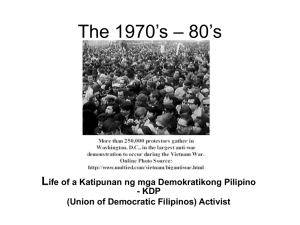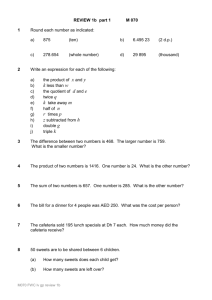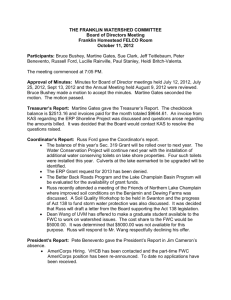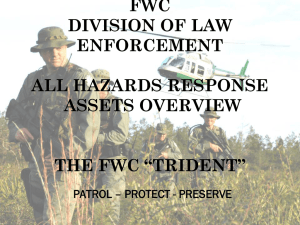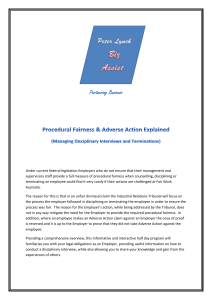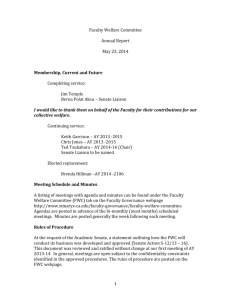Unfair dismissal for national system employees
advertisement
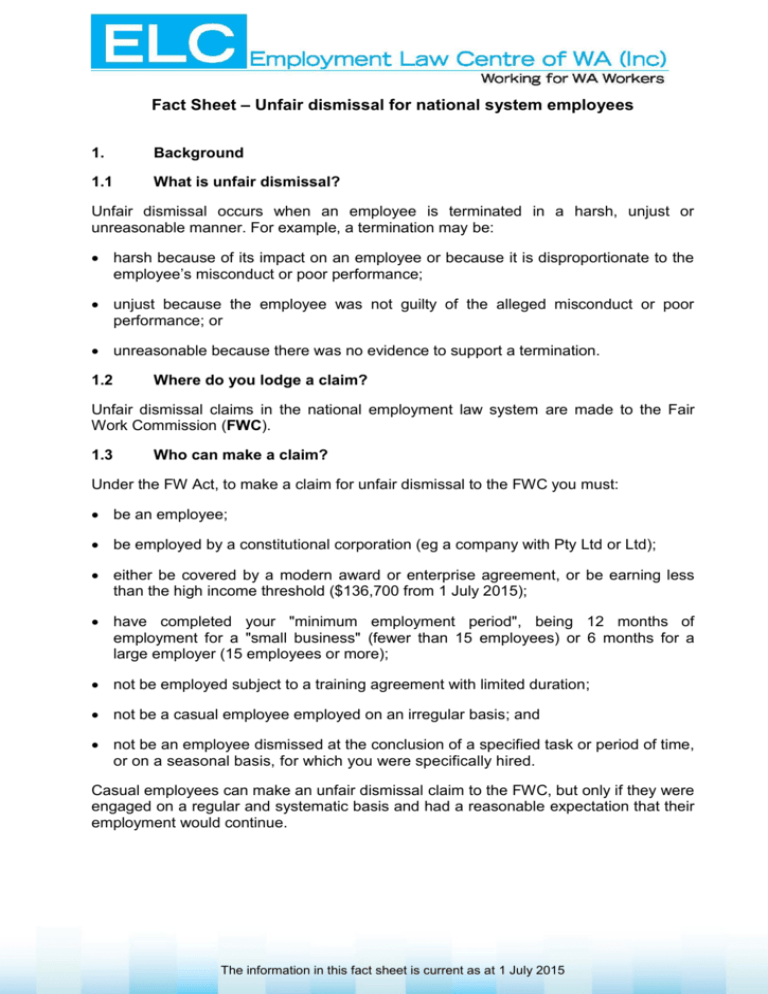
Fact Sheet – Unfair dismissal for national system employees 1. Background 1.1 What is unfair dismissal? Unfair dismissal occurs when an employee is terminated in a harsh, unjust or unreasonable manner. For example, a termination may be: harsh because of its impact on an employee or because it is disproportionate to the employee’s misconduct or poor performance; unjust because the employee was not guilty of the alleged misconduct or poor performance; or unreasonable because there was no evidence to support a termination. 1.2 Where do you lodge a claim? Unfair dismissal claims in the national employment law system are made to the Fair Work Commission (FWC). 1.3 Who can make a claim? Under the FW Act, to make a claim for unfair dismissal to the FWC you must: be an employee; be employed by a constitutional corporation (eg a company with Pty Ltd or Ltd); either be covered by a modern award or enterprise agreement, or be earning less than the high income threshold ($136,700 from 1 July 2015); have completed your "minimum employment period", being 12 months of employment for a "small business" (fewer than 15 employees) or 6 months for a large employer (15 employees or more); not be employed subject to a training agreement with limited duration; not be a casual employee employed on an irregular basis; and not be an employee dismissed at the conclusion of a specified task or period of time, or on a seasonal basis, for which you were specifically hired. Casual employees can make an unfair dismissal claim to the FWC, but only if they were engaged on a regular and systematic basis and had a reasonable expectation that their employment would continue. The information in this fact sheet is current as at 1 July 2015 1.4 What if you have been made redundant? Under the Fair Work Act 2009 (Cth) (FW Act), employers are exempt from an unfair dismissal claim in the case of a “genuine redundancy”. However, a dismissal will not be considered a genuine redundancy if: it was reasonable for the employee to have been redeployed in the employer's business or the business of an associated entity of the employer; or the employer did not comply with obligations in the applicable award or enterprise agreement to consult the employee about the redundancy. Please see the ELC Fact Sheet – “Redundancy” for more information. 1.5 The Small Business Fair Dismissal Code Your employer will be able to successfully defend your unfair dismissal claim if it is a small business (with fewer than 15 employees) and can demonstrate that it dismissed you in accordance with the “Small Business Fair Dismissal Code” (Code). The Code is established under the FW Act and is available to view on the FWC website. If you are a small business employee and your employer cannot demonstrate that it complied with the Code then the FWC will go on to consider whether or not the dismissal was harsh, unjust or unreasonable. 2. How do you lodge a claim? 2.1 General When lodging an unfair dismissal application you must: identify the employer – the legal entity who employed you; and state why you believe the dismissal was unfair. 2.2 What are the time limits? Unfair dismissal claims under the FW Act must be lodged within 21 days of the dismissal coming into effect. A late application may be accepted in some circumstances. Any late application must include reasons as to why it would be unfair for FWC not to accept the application. For further information, see ELC Fact Sheet – “Missed the deadline for making a claim: what can you do?”. 2.3 What form should you use? You should complete a Form F2 – Application for Unfair Dismissal Remedy, which is available from the FWC website (www.fwc.gov.au), or from the FWC office in your capital city. 2.4 What costs are involved? The fee for lodging an unfair dismissal application with the FWC is $68.60. The FWC can waive the application fee if it is satisfied that a person making an application will suffer serious financial hardship if the person is required to pay the fee. © The Employment Law Centre of WA (Inc) Page 2 of 6 If you behave unreasonably (for example by continuing with a claim after you become aware it has no reasonable prospect of success) and this causes your former employer to incur legal costs, then you may be subject to a costs order (where you are required to pay for some or all of your former employer’s legal costs). While you should keep this issue in mind, this type of order is unlikely as long as you are acting reasonably and in good faith. 2.5 How do you submit the application? Applications can be submitted to the FWC in your capital city in a number of ways, including in person, by telephone, by facsimile, by post or online through electronic filing on the FWC website. To deliver an application in person, go to the FWC office in your capital city between the hours of 9.00am – 5.00pm. In Perth, the address is 111 St George’s Terrace, Perth, 6000. This address can also be used for postal applications. To make an application by telephone, call the FWC on 1300 799 675. A telephone application must be followed up by a written application, lodged by one of the methods specified above, but is useful if you are running out of time to lodge your application. Payment of the lodgement fee must be made at the time of making the telephone application. Submitting an application online can be done by following the FWC e-Filing procedure, which is conducted through the FWC website. To submit an application by facsimile, simply send your application through to the nominated fax number in your capital city. In Perth, this number is (08) 9464 5171. 3. How does the FWC settle the matter? After the relevant documents have been lodged, the FWC can make initial inquiries and discuss the issues with the employer and you. If your claim is accepted, it is likely that your matter will first be listed for an informal conciliation meeting at the FWC’s premises or by telephone conference. It is very unlikely that binding orders would be made at this stage. Conciliation is designed to assist the employer and employee to reach a mutually acceptable outcome. In the event that conciliation is unsuccessful, the matter may proceed to a conference or hearing. In all proceedings managed by the FWC, including conciliations, conferences and hearings, lawyers are usually only allowed to be present to represent either party with the consent of the FWC. The FWC may grant permission for a person to be represented by a lawyer or paid agent if: it would enable the matter to be dealt with efficiently; it would be unfair not to allow representation as the person would be unable to represent himself or herself effectively; or it would be unfair not to allow representation taking into account the fairness between the parties involved in the same matter. In-house lawyers and union representatives do not need special permission to represent parties. © The Employment Law Centre of WA (Inc) Page 3 of 6 3.1 What happens at a conciliation? During conciliation, both you and your employer are invited to explain your version of events. The conciliator may ask questions to clarify facts and ask either party to respond to allegations. Often the conciliator will then talk to each party separately and help to determine what it is you are seeking and what your employer is prepared to settle for. The conciliator will then help to determine if there is an outcome that both of you are willing to accept. 3.2 Who is required to attend the conciliation? Both you and your employer should attend the conciliation. In addition: your employer may send an appropriate person from senior management who has authority to agree to a settlement; you may have a person attend the conference in support (not as your agent) if the FWC Commissioner allows; and if English is not your first language you may request that the FWC provide an interpreter. You should give the FWC as much as notice as possible about needing an interpreter. 3.3 How do you prepare for the conciliation? It will help you to be well prepared for the conciliation. You should: know your case – review what happened and prepare a summary; locate all relevant documents (e.g. medical certificates or employment contracts); seek advice from a lawyer or union; consider bringing along a support person or legal representative, if permitted; and conduct yourself in a polite, courteous manner. 3.4 What should you say at the conciliation? At the conciliation, you should be prepared to answer the following questions: What happened? What are the relevant facts? Why do you think that the termination was unfair? How was the termination carried out (were you given warnings)? What are you seeking (i.e. reinstatement, compensation)? 4. What happens at a conference or formal hearing? If conciliation is unsuccessful the matter may go on to a conference or hearing. A conference is a more structured process than conciliation and can result in a binding outcome. A public hearing is similar in many ways to a court hearing. For this reason © The Employment Law Centre of WA (Inc) Page 4 of 6 many people prefer to be represented by a lawyer in a hearing, however most claimants are capable of representing themselves if they are adequately prepared. The FWC will only deal with the matter in a formal public hearing if, after considering the views of the parties, it believes that it would be the most effective and efficient way to resolve the matter. During the hearing, the FWC Commissioner can ask questions directly to the employer and employee. After hearing from both parties, as with the conference, the FWC Commissioner can then make a decision that is binding on the employer and employee. 5. Further information The Employment Law Centre of WA (Inc) Advice Line Web Hours 1300 130 956 or 08 9227 0111 www.elcwa.org.au Monday 8:30am to 5:00pm Tuesday 8:30am to 7:30pm Wednesday CLOSED Thursday 8:30am to 5:00pm Friday CLOSED Fair Work Commission 111 St George’s Terrace, Perth 6000 1300 799 675 9464 5171 www.fwc.gov.au perth@fwc.gov.au Address Tel Fax Web Email 6. Disclaimer By using this publication and the information* contained within it, you agree that: The Employment Law Centre of WA (Inc), and its directors, employees and agents (ELC), do not accept responsibility for any consequences, including loss and/or damage, arising from your access to, or use of, the information contained in this publication, or from your reliance on any materials contained within this publication. While the information has been formulated with all due care, ELC does not guarantee the accuracy, currency, reliability or correctness of any of the information, nor that the information provided is exhaustive. This publication, and all the information therein, is intended to be for informational purposes only and is not intended to provide or replace specialist legal advice. ELC does not accept responsibility for the accuracy, currency, reliability or correctness of any information included within the publication that has been provided by third parties, including third party website links. None of the information or materials provided within this publication may be used, reproduced or transmitted, in any form or by any means, without written permission from ELC. Ultimately, you use this publication, and the information contained within it, at your own discretion and risk. You accept as a condition of your use of this © The Employment Law Centre of WA (Inc) Page 5 of 6 publication and the information contained therein that you will make no claim for any loss, damage or expense that may arise from your use of publication, or your reliance on any of the information contained within it. If you have concerns or questions about any of the above, you should contact ELC for assistance on 1300 130 956. *Information includes any and all data, documents, pages and images. © The Employment Law Centre of WA (Inc) Page 6 of 6
